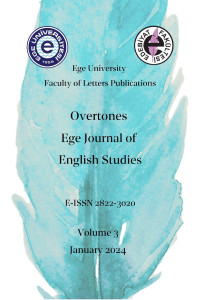Abstract
Phoebe Waller-Bridge's monologue, Fleabag, examines the unnamed female protagonist' s immersion into an experience of loss, grief, familial troubles and emotional depravity. The protagonist primarily appears to be an emotionally volatile, quite cynical and quite sexually active young woman. Her tight grasp of the audience's attention constitutes a vital tool around which the whole narrative is constructed. Waller-Bridge's protagonist craves to establish an authentic emotional connection by attempting to remedy the unresolved trauma that resides in her recent past. By forging the narrative of an ostensibly “bad feminist”, building on moments of shame, desire and endless humor, the writer forges a complex relation of intimacy and distance with the audience by exploiting audience attention in order to maintain a sense of vulnerability and alienation. The protagonist draws pleasure from experiences of “abjection” - including some discomforting experiences edging on pain and shame - in an attempt to attain a state of "ecstasy". In truth, this pertains to her endeavors to expel what makes her emotionally volatile by drawing pleasure from painful and self-damaging modes of behaviour.
References
- Fountain, J. Stephen. “Ashes to Ashes: Kristeva’s ‘Jouissance’, Altizer’s Apocalypse, Byatt’s Possession and ‘The Dream Of The Rood.’” Literature and Theology 8.2 (1994): 193–208. <http://www.jstor.org/stable/23926718>.
- Geis, Deborah R. Postmodern Theatric(k)s: Monologue in Contemporary American Drama. Michigan: U of Michigan P, 1996.
- Karlyn, Kathleen Rowe. Unruly Girls, Unrepentant Mothers: Redefining Feminism on Screen. Austin: U of Texas P, 2011.
- Kristeva, Julia. Powers of Horror: An Essay of Abjection. Columbia: Columbia UP, 1982.
- McAfee, Noëlle. Julia Kristeva. London: Routledge, 2004.
- Waller-Bridge, Phoebe. Fleabag. London Nick Hern Books, 2013.
- Wanzo, Rebecca. “Precarious-Girl Comedy: Issa Rae, Lena Dunham, and Abjection Aesthetics.” Camera Obscura: Feminism, Culture, and Media Studies 31.2 (2016): 27-59. DOI:10.1215/02705346-3592565.
Abstract
References
- Fountain, J. Stephen. “Ashes to Ashes: Kristeva’s ‘Jouissance’, Altizer’s Apocalypse, Byatt’s Possession and ‘The Dream Of The Rood.’” Literature and Theology 8.2 (1994): 193–208. <http://www.jstor.org/stable/23926718>.
- Geis, Deborah R. Postmodern Theatric(k)s: Monologue in Contemporary American Drama. Michigan: U of Michigan P, 1996.
- Karlyn, Kathleen Rowe. Unruly Girls, Unrepentant Mothers: Redefining Feminism on Screen. Austin: U of Texas P, 2011.
- Kristeva, Julia. Powers of Horror: An Essay of Abjection. Columbia: Columbia UP, 1982.
- McAfee, Noëlle. Julia Kristeva. London: Routledge, 2004.
- Waller-Bridge, Phoebe. Fleabag. London Nick Hern Books, 2013.
- Wanzo, Rebecca. “Precarious-Girl Comedy: Issa Rae, Lena Dunham, and Abjection Aesthetics.” Camera Obscura: Feminism, Culture, and Media Studies 31.2 (2016): 27-59. DOI:10.1215/02705346-3592565.
Details
| Primary Language | English |
|---|---|
| Subjects | Contemporary Drama Studies |
| Journal Section | Research Articles |
| Authors | |
| Publication Date | January 22, 2024 |
| Submission Date | August 1, 2023 |
| Published in Issue | Year 2024 Issue: 3 |


